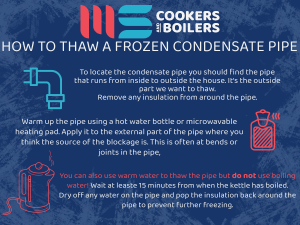Troubleshooting Your Boiler with MS Cookers and Boilers: 10 Common Problems and Expert Solutions for a Warm, Worry-Free Home
Experiencing a boiler breakdown can be a frustrating and stressful situation, especially when it leaves you without heating or hot water. Knowing the common issues can help you identify the problem quickly and, in some cases, resolve it yourself. At MS Cookers and Boilers, we’re here to share our knowledge of the 10 most common boiler problems. Knowledge is power we’re here to help you learn how to diagnose the problem and restore your home’s heating quickly.
1. The Pilot Light Keeps Going Out
A faulty pilot light can leave your boiler unable to ignite, resulting in no heating or hot water. This issue can be caused by a broken thermocouple, a draught blowing out the flame, or a buildup of debris in the pilot light nozzle. Faulty pilot lights are commonly found on older boilers as modern boilers tend to have electric ignition.
How to Fix It: Check the gas supply first by checking to see if any other gas appliance (hob, oven or gas fire) is working. If the gas supply is fine, try relighting the pilot light according to your boiler’s manual. If it continues to go out, contact a Gas Safe engineer for further inspection.
2. The Boiler is Making Noises (Gurgling, Whistling, or Banging)
One of the most common boiler problems is a boiler making funny noises. Unusual noises from your boiler could indicate air in the system, a faulty pump, or a buildup of limescale, also known as “boiler kettling.”(see more about this below).
How to Fix It: Bleed your radiators to remove any trapped air. If the noise persists, it may be a sign of kettling (covered in more detail below), which requires a professional inspection to descale the system.
3. No Heating or Hot Water
There’s nothing worse, in the middle of winter, than having no heating and no hot water. If your boiler is not providing heating or hot water, this could be due to several issues, such as low pressure, thermostat problems, or broken diaphragms and airlocks. Sometimes its a simple fix and other times you may need an engineer.
How to Fix It: You should first check the thermostat settings and boiler pressure. If both are within the recommended range, but the problem persists, it’s best to consult an engineer.
4. Boiler is Leaking
A leaking boiler can be caused by a range of issues, including a broken seal, corroded pipes, or a faulty pressure valve. Leaks can lead to serious damage and should be addressed immediately.
How to Fix It: Turn off the water supply and call a Gas Safe registered engineer. Avoid attempting to fix a leak yourself, as it could worsen the issue.
5. Low Boiler Pressure
Boiler losing pressure is a common issue that can lead to your heating system not functioning properly. It is usually caused by a leak, a broken pressure relief valve, or recent radiator bleeding.
How to Fix It: Check the pressure gauge on the boiler. If it’s below 1 bar, repressurise the system using the filling loop. If pressure continues to drop, it indicates a potential leak, which requires professional attention. You can check out our youtube video on how to repressurise an oil boiler here: http://https://www.youtube.com/watch?v=zHwS259OR6I
6. Radiators are Cold
Cold radiators can result from trapped air, sludge buildup, or balancing issues within the system. This often leads to uneven heating across your home.
How to Fix It: Bleed the radiators to release any trapped air. If the problem persists, a power flush might be needed to remove sludge from the system. An engineer can also help balance the radiators to ensure even heat distribution.
7. Boiler is Kettling
Kettling happens when limescale or sludge accumulates in the heat exchanger, causing the boiler to overheat and produce a sound similar to a kettle boiling. You can recognise by the sound as it is just like the bubbling of a boiling kettle.
How to Fix It: Power flushing can help remove limescale and sludge buildup. Installing a scale reducer can also prevent future occurrences.
8. The Boiler is Not Responding to the Thermostat
If your boiler is not responding to the thermostat, it could be due to faulty thermostat settings, dead batteries, or signal interference.
How to Fix It: Check the thermostat settings and replace the batteries. If the problem persists, there could be an issue with the boiler’s internal controls, requiring a professional inspection.
9. Frozen Condensate Pipe
During cold weather, the condensate pipe can freeze, causing a blockage that prevents the boiler from functioning. Signs include gurgling noises and error codes on the display. Your boiler may even stop working.
How to Fix It: Thaw the pipe using warm (not boiling) water and insulate it to prevent future freezing. If you are unsure, call a professional to assist you safely.

10. The Boiler Keeps Switching Off
Frequent boiler shutdowns can indicate problems such as low water pressure, a faulty thermostat, or an issue with the pump.
How to Fix It: Check for low pressure or thermostat issues first. If these seem fine, a broken pump or blocked heat exchanger may be the cause, which requires a qualified engineer.
AT MS Cookers and Boilers We’re Here to Help
Addressing boiler problems promptly can help you avoid further complications and costly repairs. While some minor issues can be resolved at home, always prioritise safety. For complex or persistent problems, it’s essential to consult a qualified Gas Safe engineer.
If you’re facing a boiler breakdown or boiler losing pressure in Huddersfield, Halifax, or surrounding areas, contact MS Cookers and Boilers for professional service and peace of mind.

